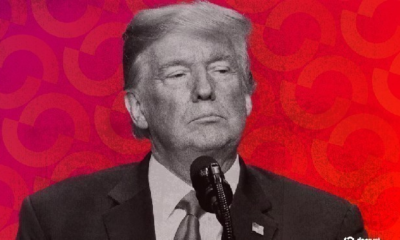Policy & Regulation
Will the Senate’s leaked DeFi bill drain what’s left of US liquidity?

Credit : cryptoslate.com
A confidential invoice circulating amongst Senate Democrats proposes sweeping new oversight of DeFi, increasing Know-Your-Buyer (KYC) and Anti-Cash-Laundering (AML) duties to DeFi interfaces, validators, and even node operators.
In accordance with studies, the leaked invoice was meant as a counterweight to Democrats’ Home-backed market construction invoice. Nonetheless, inside reactions have reportedly stalled broader discussions throughout the Senate Banking Committee.
In accordance with the leaked framework, all DeFi functions that allow monetary transactions should implement front-end KYC controls, doubtlessly together with browser-based wallets and liquidity interfaces.
The leaked language additionally locations new duty on oracle operators, doubtlessly exposing them to enforcement if value feeds are tied to “sanctioned” protocols.
The Treasury Division would even be given the authority to create a “restricted checklist” of protocols deemed too dangerous for US customers.
Senator Ruben Gallego claimed that the Democrats’ invoice represents the occasion’s try and construct a bipartisan consensus on the construction of the crypto market.
In accordance with him:
“Democrats are able to get to work… They requested for paper and content material, and we delivered.”
Market affect
The transfer has sparked a brand new spherical of partisan tensions in Washington, with Republican lawmakers and crypto trade figures warning it may cripple innovation and push U.S. Bitcoin and Ethereum liquidity overseas.
To grasp the chance, one should take into account the present panorama wherein US-based platforms account for less than a small portion of world quantity.
In accordance with information from Newhedge, US crypto buying and selling platforms already account for lower than 10% of world buying and selling quantity, whereas the highest eight (primarily offshore) platforms account for round 90% of world market depth.

These figures present that liquidity is already being drawn to platforms with fewer regulatory restrictions. Compelled compliance with the Senate’s proposal on the protocol degree may speed up that flight.
If US customers are compelled to speak solely by way of KYC-verified entrance ends, or if the Treasury Division can block entry to particular protocols, merchants looking for anonymity, flexibility, and fewer friction might migrate to bridges or overseas exchanges the place these restrictions are looser or unenforced.
Over time, that shift would entrench offshore platforms as liquidity hubs, deepen the dominance of already giant non-US exchanges and fragment buying and selling throughout jurisdictions.
On the similar time, US liquidity swimming pools would shrink as a result of fewer lively counterparties, wider spreads and decreased depth. That fragmentation would hinder innovation, exacerbate market inefficiencies, and weaken the U.S. aggressive place on the worldwide crypto rails.
Moreover, the implementation of those guidelines may affect US crypto customers’ interactions with the fast-growing DeFi sector.
A latest report from DeFi Funds exhibits that many Individuals don’t belief the normal monetary system.
Because of this, they’ve change into curious concerning the DeFi trade, which they imagine gives extra advantages over the present system, together with management over their funds and decrease transaction charges.
Trade response
Given the numerous market affect this invoice would have available on the market, trade stakeholders have began talking out towards it.
Jake Chervinsky, Variant Fund’s chief authorized officer, mentioned:
“Many points of the invoice are essentially damaged and unworkable. This isn’t a ‘first provide’ in a negotiation, it’s a checklist of calls for that seem designed to kill the invoice.”
Chervinsky went on to say that this was an “unprecedented occasion.” [and] unconstitutional authorities takeover of a whole trade.” He added:
“It isn’t simply anti-crypto, it is anti-innovation and a harmful precedent for the complete tech sector.”
Zack Shapiro, head of coverage on the Bitcoin Coverage Institute, echoed this view by mentioning that the draft “extends unlawful monetary legal guidelines to focus on software program and software program builders reasonably than felony conduct.”
He mentioned this units a harmful precedent for censoring respectable non-public exchanges, much like how the federal government has focused Twister Money and Samourai Pockets builders.
Coinbase CEO Brian Armstrong mentioned the invoice would “set innovation again years” and forestall America from being a pacesetter in crypto finance.
He acknowledged:
“We completely is not going to settle for this. It’s a unhealthy proposal, plain and easy, that may stifle innovation and forestall the US from turning into the crypto capital of the world.”
Uniswap founder Hayden Adams added that the language would “kill DeFi domestically.”
Contemplating this, he known as for “an enormous shift from Democratic senators” if progress on market construction reform is to proceed.
Talked about on this article
-

 Meme Coin7 months ago
Meme Coin7 months agoDOGE Sees Massive User Growth: Active Addresses Up 400%
-

 Blockchain1 year ago
Blockchain1 year agoOrbler Partners with Meta Lion to Accelerate Web3 Growth
-

 Videos1 year ago
Videos1 year agoShocking Truth About TRON! TRX Crypto Review & Price Predictions!
-

 Meme Coin1 year ago
Meme Coin1 year agoCrypto Whale Buys the Dip: Accumulates PEPE and ETH
-

 NFT9 months ago
NFT9 months agoSEND Arcade launches NFT entry pass for Squad Game Season 2, inspired by Squid Game
-

 Solana4 months ago
Solana4 months agoSolana Price to Target $200 Amid Bullish Momentum and Staking ETF News?
-

 Ethereum1 year ago
Ethereum1 year ago5 signs that the crypto bull run is coming this September
-

 Gaming1 year ago
Gaming1 year agoGameFi Trends in 2024


































